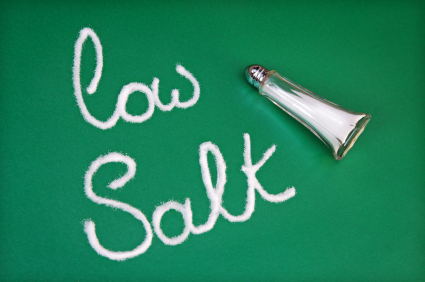Kidney Diet Tip: Please Pass Over the Salt
 The Dietary Guidelines for Americans recommend all people reduce sodium to 2,300 mg or less. For African Americans of any age, people who are 51 and older, or those with hypertension, diabetes, or chronic kidney disease, the sodium recommendation is 1,500 mg or less. Meeting these low-sodium diet guidelines would be easier to monitor if you bought only fresh, whole foods and prepared them at home. In current times, that just doesn’t seem so doable. Enjoying the convenience of packaged foods and prepared meals as well as the pleasure of eating out at a restaurant mean you really don’t know how much sodium is in the food you consume.
The Dietary Guidelines for Americans recommend all people reduce sodium to 2,300 mg or less. For African Americans of any age, people who are 51 and older, or those with hypertension, diabetes, or chronic kidney disease, the sodium recommendation is 1,500 mg or less. Meeting these low-sodium diet guidelines would be easier to monitor if you bought only fresh, whole foods and prepared them at home. In current times, that just doesn’t seem so doable. Enjoying the convenience of packaged foods and prepared meals as well as the pleasure of eating out at a restaurant mean you really don’t know how much sodium is in the food you consume.
One of the easiest ways to cut down on sodium intake is to pass up using table salt. It may take some getting used to, especially if it’s been a lifelong habit to add salt to foods—sometimes even without tasting first.
Always check the sodium content on food packaging and choose the lowest sodium options. Processed food contributes more sodium to modern-day diets than the salt shaker. Even foods that don’t taste salty can contain a fair amount of sodium. Keep in mind that nutrition labels will show the sodium amount for one serving. If you eat more than one serving, you will need to do the math to figure out how much sodium you’re really eating.
Avoiding foods that are obviously high in sodium, such as canned meats, deli meats, processed cheese, canned soups, chips and other salty foods is another way to pass on salt. Avoiding and limiting salt doesn’t mean you can never have a salty treat. Just make sure your other meals are very low in sodium to make up for a salty “cheat”.
Most of us are unaware of how much sodium we consume, even if doing the things suggested above. You can use the Nutrition Log in DaVita Diet Helper online kidney diet meal planner to track the foods you eat throughout the day. Not only will you know how much sodium you consume, you’ll also see how much potassium, phosphorus, protein, calories, carbohydrate, fat, cholesterol, and fiber you are eating.
What’s your favorite low-sodium diet tip?
Kidney diet resources from DaVita.com
- Discussion Forums
- myDaVita.com Account and Newsletters
- DaVita Diet Helper
- Phosphorus ChallengeTM
- Food Analyzer
- DaVita Cookbooks

Recent Comments